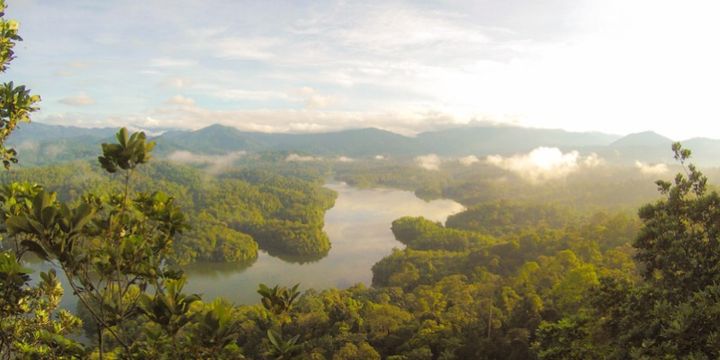A friend of mine recently shared this article which asks "how bad will climate change be?" and answers "not very." I started writing a brief reply but before I knew it quite a few words had emerged, so here they are. While it would be lovely to think that we are overestimating the dangers of climate change, I just don't think that's justifiable. Actually, I think it's quite dangerous.
The leading paragraph suggests that because climate change will be "cataclysmic but not apocalyptic" it won't be that bad. This strikes me as quite a ludicrous stance to take. To justify this viewpoint the article looks at estimates of various climate change impacts (on food, water, etc.) and attempts to put them in a broader, historical perspective. There's also a strong focus on non-climate related developments, e.g. improvements in food production, as a way to help offset or even alleviate the impacts altogether.
Now, if improved food production techniques can save lives in the coming years, great! But how does that justify or minimise the massive loss and degradation of life that climate change will accrue? Why can't we benefit from technological improvements AND tackle climate change as a priority? Just because we have weathered crises before doesn't give us any right to sit back and let this one, which we are the cause of, wreak havoc when we could do something about it. Suggesting 529,000 lost lives isn't so bad in the grand scheme of things because millions more will be saved by improved diets is a pretty sick brand of utilitarian thinking.
The article also contains absolutely no mention of biodiversity loss or habitat loss for any species other than us humans. There is ample evidence that climate change's impact on ecosystems will be huge. Even if the thought of irreversibly wiping out thousands of other species is of no concern to you in and of itself, the impact this will have on our own lives (weakened food-chains, loss of pollinators, etc.) is huge and potentially devastating.
The article does, however, contain a lot of cherry-picking of statistics. The IPCC report referenced to downplay crop impacts also notes that "after 2050, the risk of more severe impacts increases", and "relatively few studies have considered impacts on cropping systems for scenarios where global mean temperatures increase by 4°C or more." (which we're currently on track for). The more extreme and long-term effects are still not well understood, for food or many other impacts (see also: cascading environmental tipping points).
The article also states that relying on wind and solar as a path to decarbonisation will "likely prove impossible" but provides no sources for that assertion. So wind and solar are deemed to be impractical, but outdoor "cooling bubbles" and widely-deployed, massively energy-intensive AC systems which prove that "extreme heat is becoming quite liveable" are all good? And, further, a reason to not worry about rising temperatures? Is that the world we want to live in?
If we do want renewable energy then fracking is apparently "indispensable for balancing wind and solar." But again, no source is provided for this assertion either. Advocating for new extraction of fossil fuels, even in the context of an article downplaying the impacts of rising temperatures, is incredibly careless. The evidence is very clear that to stave off the worst impacts of climate change we need to get to zero emissions ASAP, and keep all untapped reserves in the ground.
The assertion that "climate change will make only modest inroads into growth rates" is also quite an optimistic interpretation of the IPCC report which says:
"The impacts of climate change may decrease productivity and economic growth, but the magnitude of this effect is not well understood. There is agreement that climate change would slow economic growth, by a little according to some studies and by a lot according to other studies. Different economies will be affected differently. Some studies suggest that climate change may trap more people in poverty."
And that follows the, unreferenced and unsubstantiated, claim that "economic growth will make life better despite global warming". This, I think, is actually the crux of the article's argument and underlies it's other points and attempts to minimise climate impacts. Belief that the business-as-usual, endless economic growth model (which got us into this mess, riding on the back of plentiful energy via rapid fossil fuel extraction) will get us out of trouble, too, if we just let it do its thing.
I strongly disagree with that notion! I think solving climate change and all the other critical issues that the article mentions, generally related to meeting people's needs requires a radical rethink of our economic systems. This is something Kate Raworth delves into in depth in Doughnut Economics which I've previously written some thoughts about. And it's something I'm looking to expand on in the future as well.
Although seemingly better than outright denialism, this flavour of climate gradualism or "sure, climate change is happening, but it won't be that bad. Don't worry, we'll solve it eventually" is, I think, actually more dangerous. It distorts the fact that we need "rapid, radical action if we're going to have any chance of tackling this problem that we're only just beginning to take seriously, far later than we should have." If you want some interesting reading from this perspective I highly recommend Alex Steffen's writing.
Climate change is an existential threat. It's certainly not the only problem we face as a species or a planet, but it will exacerbate all of our other problems. You can question the validity and effectiveness of doomsday-style climate coverage and public perception of the issue, but I don't believe you can, in good conscience, downplay the severity of the problem itself.
Photo by Eutah Mizushima on Unsplash.
